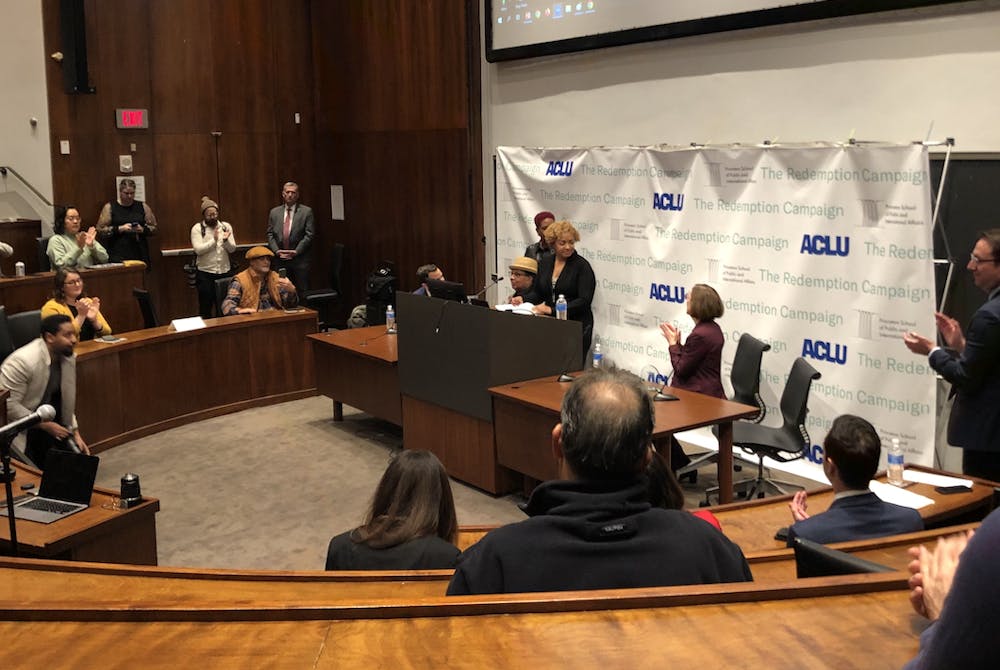Last week, Oregon Governor Kate Brown, formerly-incarcerated advocate Michael Thompson, and New Jersey Attorney General Matthew J. Platkin spoke at the University on the importance of clemency in prison reform.
The Dec. 4 event was moderated by Udi Ofer, a visiting professor in the School of Public and International Affairs (SPIA), and former Deputy National Political Director for the American Civil Liberties Union (ACLU).
“[T]he United States has the distinction of being the world’s largest incarcerator,” SPIA Dean Amaney A. Jamal said in her introduction to the event, saying that members of Black and brown communities are arrested at disproportionately higher rates.
“It would be easy to feel despair at this issue, but as we will discuss today, the past several years have featured some innovative solutions to move the nation in a new direction,” she shared.
Clemency, which refers to the power of the U.S. president or state governor to pardon or commute the sentence of an incarcerated person, represents one potential solution to what panelists described as the mass incarceration crisis.
“[Clemency] is an incredibly useful tool to correct injustices in my state and country. It is an underutilized tool to enhance rehabilitation,” Brown said at the event.
Brown pardoned 47,144 people convicted of marijuana-related offenses late last month, following similar action from President Biden in October.
“Releasing incarcerated people would enable them to receive medical support and services of which they were deprived in prison,” Brown added.
Ofer asked Brown about her thoughts about the role of tough-on-crime politics in the recent midterm election.
Brown called the midterm election “incredibly challenging,” but affirmed that it hasn’t changed her thinking around clemency. She described her work advocating for juvenile sentencing reform in Oregon, which enabled her to grant clemency to 73 incarcerated people, who had committed crimes as minors.
“[Clemency] is an opportunity, I think, to save lives, and eventually, save the world,” Brown said.
“What it costs to put people behind bars, you could take that money and frontload it into our early childhood education,” she said later in the panel.

Thompson, who was incarcerated for 25 years on cannabis charges, is one of the people who have benefited from clemency policies, like the ones Brown described. At the time of his release, Thompson was Michigan’s longest-serving non-violent offender.
After being pardoned by Governor Gretchen Whitmer in 2020, he founded the Michael Thompson Clemency Project to advocate for unjustly incarcerated individuals.
“I wasn’t supposed to get out of prison until 2038. But look at me,” he said. “People showed humanity, and had hearts and a conscience. Some people don’t care about their conscience — they’re strictly political. They only think about their careers. But what about other people? What about their families?”
Thompson said that the Clemency Project was important to him because he could give people hope. He explained that politicians don’t care about formerly-incarcerated people because their votes don’t count, and taxpayers don’t care about them because they pose a burden. When people get out of prison, they feel that nobody cares about them, and face difficulty helping themselves and their families.
At the event, Thompson recalled watching a fellow prisoner get shackled, tased, and put on a dog leash. As he left prison, He remembered hearing in his head, “Meeko [Thompson’s nickname in prison]. Tell the truth. And don’t forget about us.”
“I know these people. I did 25 years with them. Everybody in prison is not bad. You can’t throw everybody in one basket,” Thompson said. “I look at me and I’m not who they say I was. But they can take a pencil and make you look like a real bad person.”
Cynthia Roseberry, the Acting Director of the ACLU’s Justice Division, inaugurated and granted the Lewis Conway Jr. Leadership in Clemency Award to Brown to celebrate the tens of thousands of commutations issued under her administration. Brown shared the award with Thompson.
“In founding the Michael Thompson Clemency Project to aid others who remain behind bars, Mr. Thompson volunteered to traverse again what must have been treacherous ground. To go back into the belly of the beast, go back into the trauma to help pull others out, like first responders who run toward the danger to help others,” Roseberry said.
“It’s up to us to work to make sure that the humanity of everyone involved in the system is recognized,” she added.
Danielle Ranucci is a staff writer who loves covering human interest stories. Please direct all corrections to corrections[at]dailyprincetonian.com.
Correction: Information attributed to Dean Jamal appeared as a quote erroneously in a previously version of this article. In fact, it should have appeared as paraphrased text. The ‘Prince’ regrets this error.








